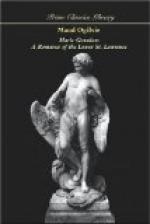CHAPTER VIII
TEN YEARS AFTER.
“Oh! wouldst thou set thy rank before
thyself?
Wouldst thou be honored for thyself
or that?
Rank that excels the wearer, doth
degrade,
Riches impoverish that divide respect.”
Sheridan Knowles
The morning-room at Glen McAllister was an ideal room of its kind, in a rather plain and severe style. The floor was covered with dainty blue and white straw matting, and huge rugs of musk-ox skin, from the wilds of the great North-West of Canada, were scattered here and there about the room. At a large desk, looking as if it might belong to a man with an immense business connection, sat Lady Margaret McAllister. She was adding accounts with a methodical accuracy and speed even a bank clerk could not hope to excel. She was a woman of about forty, though looking younger, her hair being of that tawny shade of yellow that rarely turns grey, and her complexion bright and fresh, bearing witness to a healthy outdoor life.
That morning she was very busy counting up the week’s expenses, and trying to explain to her husband that the conduct of their bailiff was most reprehensible. Lady Margaret always used long words in preference to short ones, which might express exactly the same meaning. This was one of her peculiarities.
“Three months’ rent for the Mackay’s farm is due, Noel. I really think you might bestir yourself a little to look after the estate. Jones is the most execrable manager I ever knew. Here you are, with nothing to do all day except smoke or shoot, letting things go to rack and ruin. We shall be in the poor-house soon. Umph! I’ve no patience with you.”
“No, my dear, you never had, and each year you have less. I am, indeed, a sore trial to you,” replied her husband, smiling placidly.
“You are, there can be no question about that,” said Lady Margaret, bitterly.
Noel took his cigar out of his mouth, looked at her calmly for a moment, and said:
“Then why——”
“Why—Yes, I know what you are going to say, you have said it so frequently—why did I marry you?” she interrupted.
“You have guessed rightly, my dear; that was just what I was about to remark.”
“I married you because I could not help myself.”
“Oh, yes, you could. You might have refused, and I would have gone back to Canada—would gladly have done so.”
“No, Noel,” said his wife, rising and standing before him, a rather terrifying figure; “be at least truthful. You would not have given up the estate even though it was burdened with an incubus like me.”
“Well, well, my dear,” said Noel, yawning aggravatingly, “all that is over. As your poet says, ‘Let the dead past bury its dead.’”
“Inexact in small things as well as great,” said Lady Margaret, who had returned to her accounts. “Your poet, you mean, for your quotation is from Longfellow, and he lived nearer your country than mine.”




